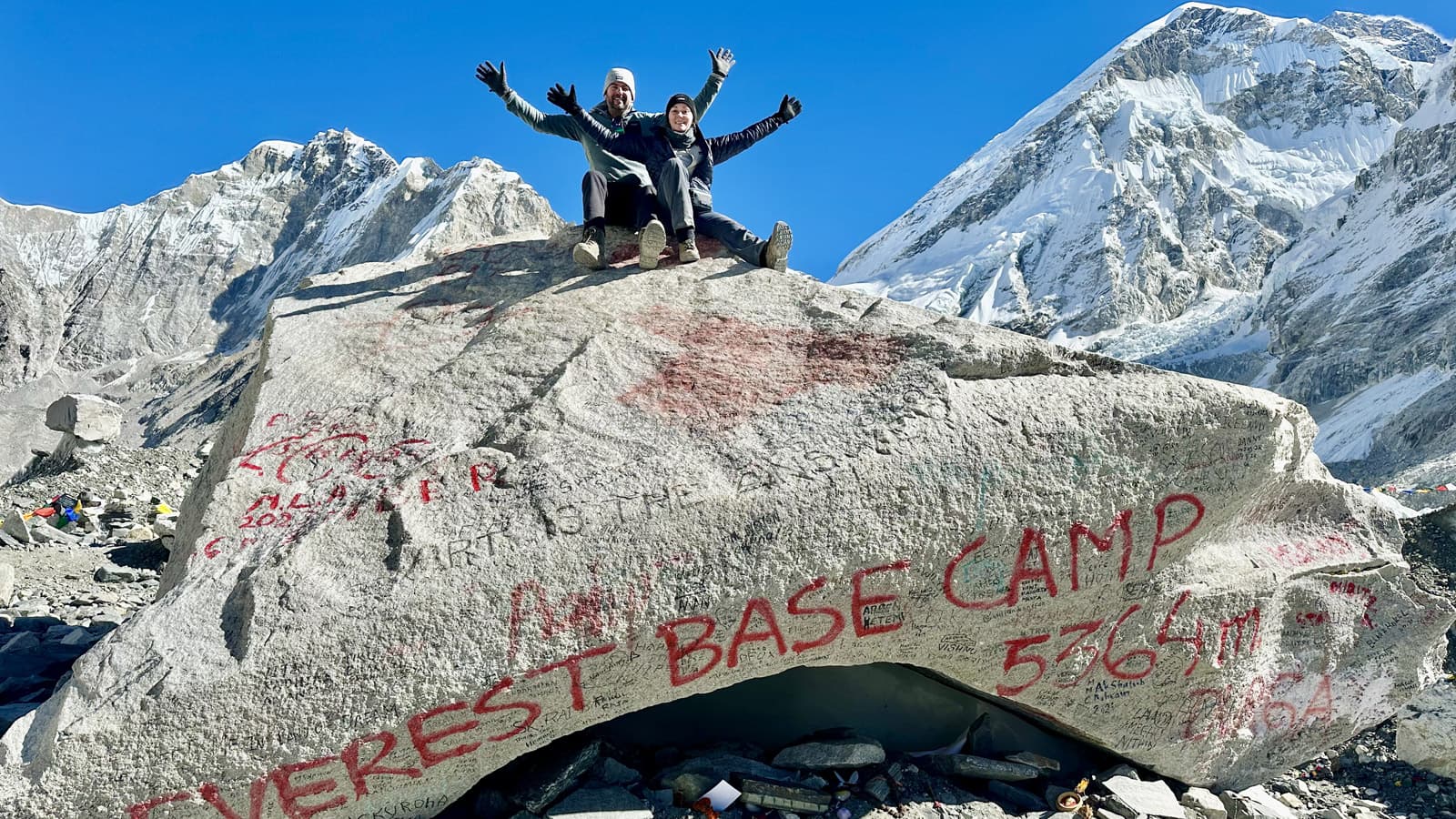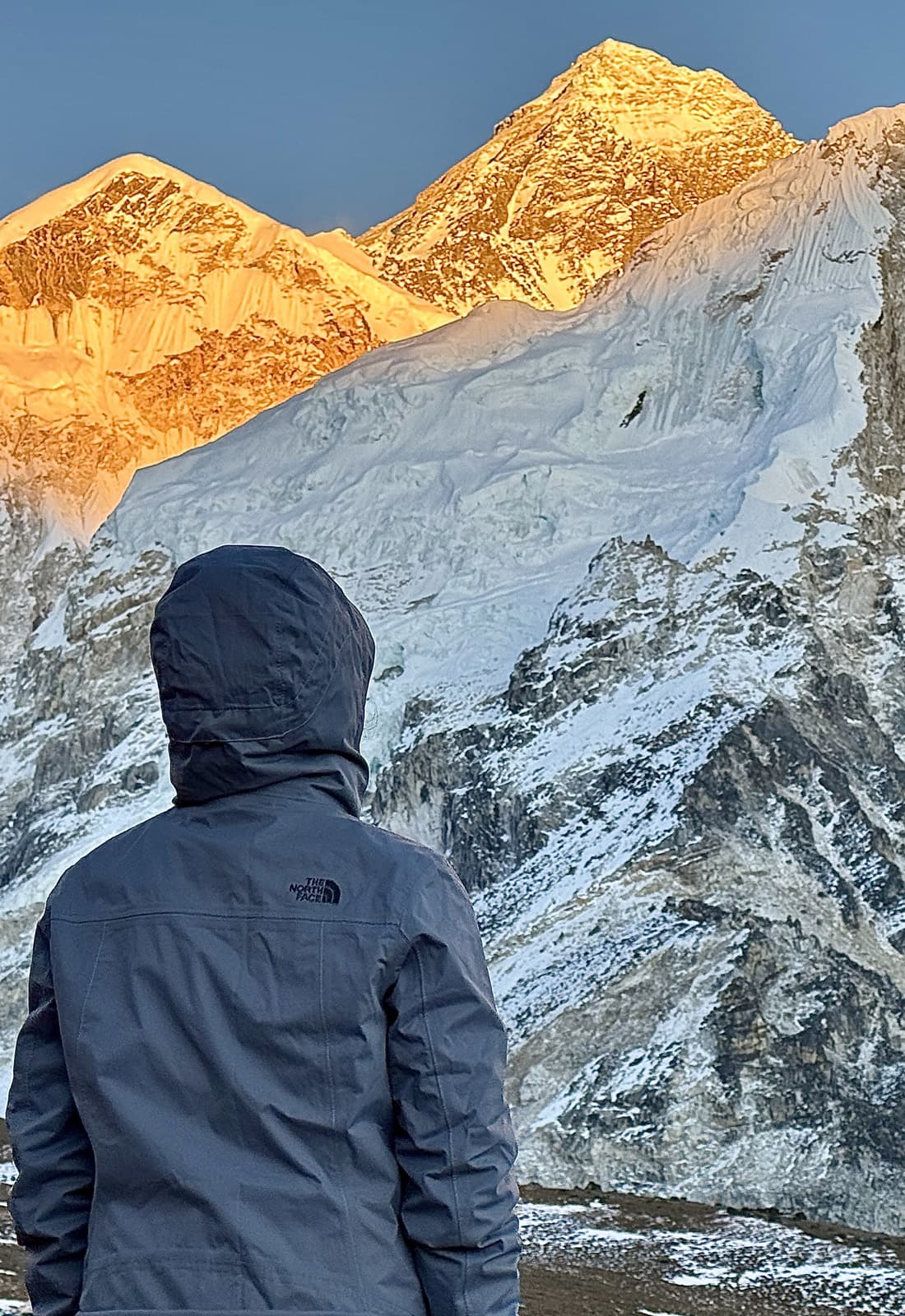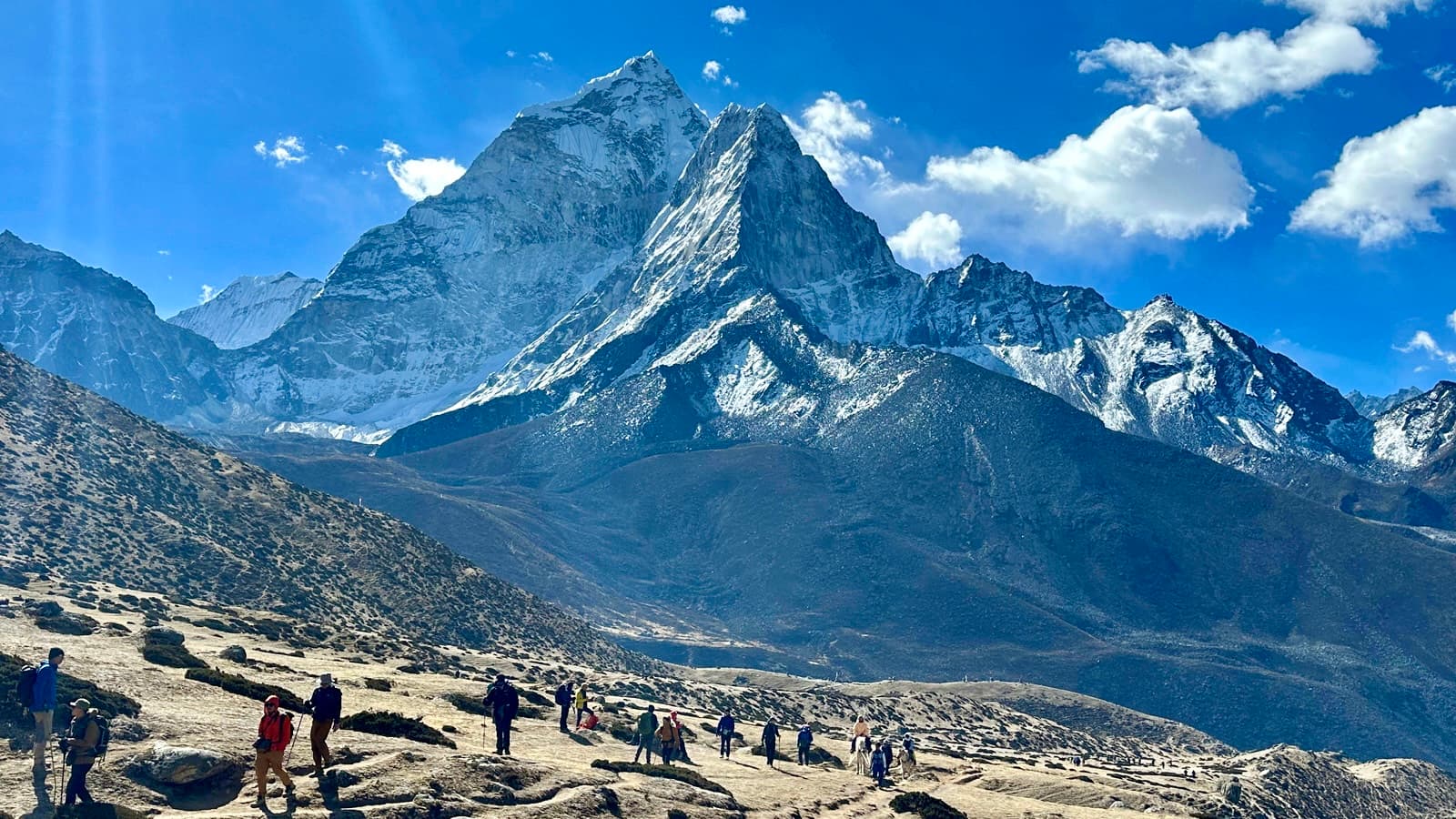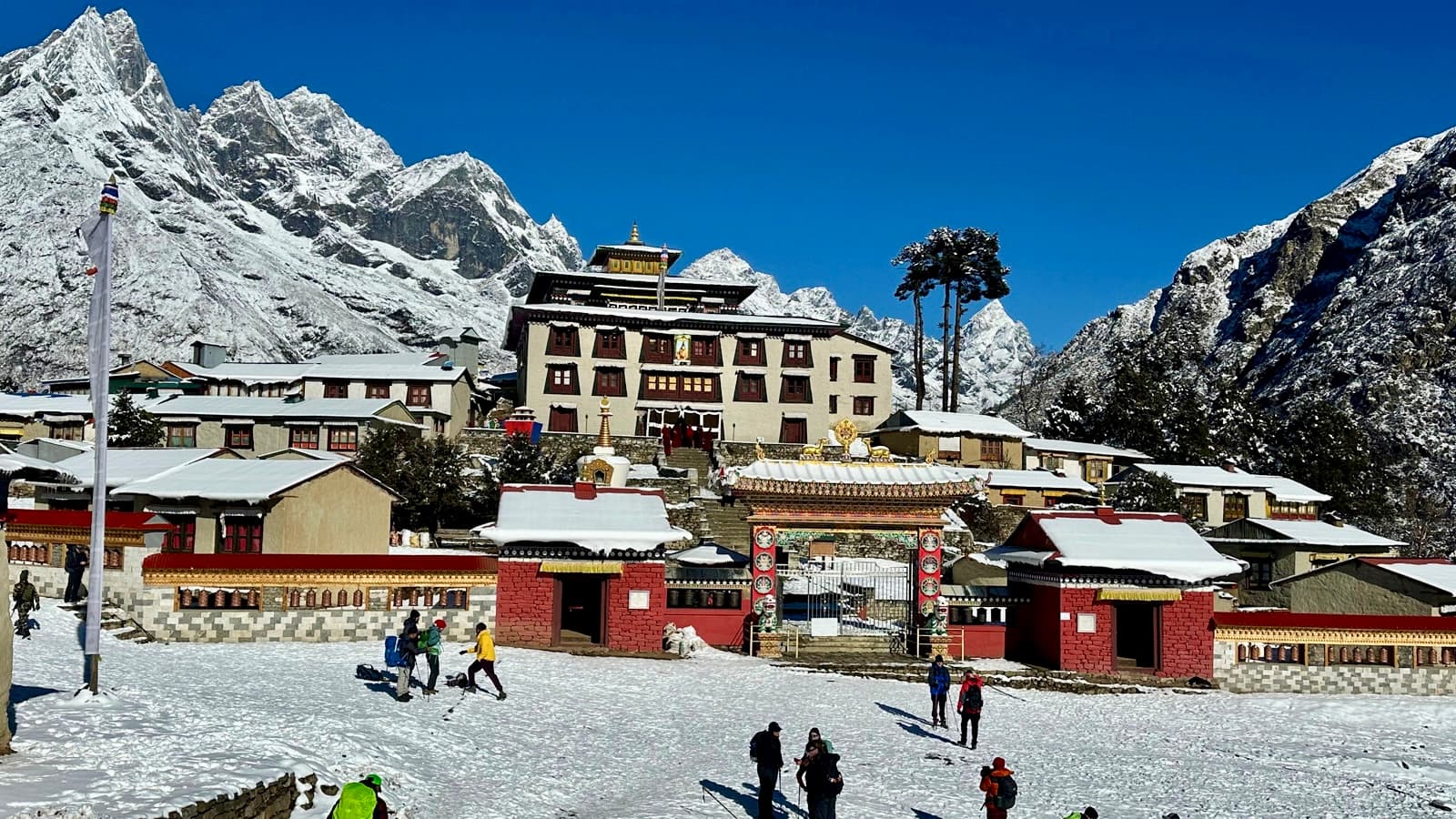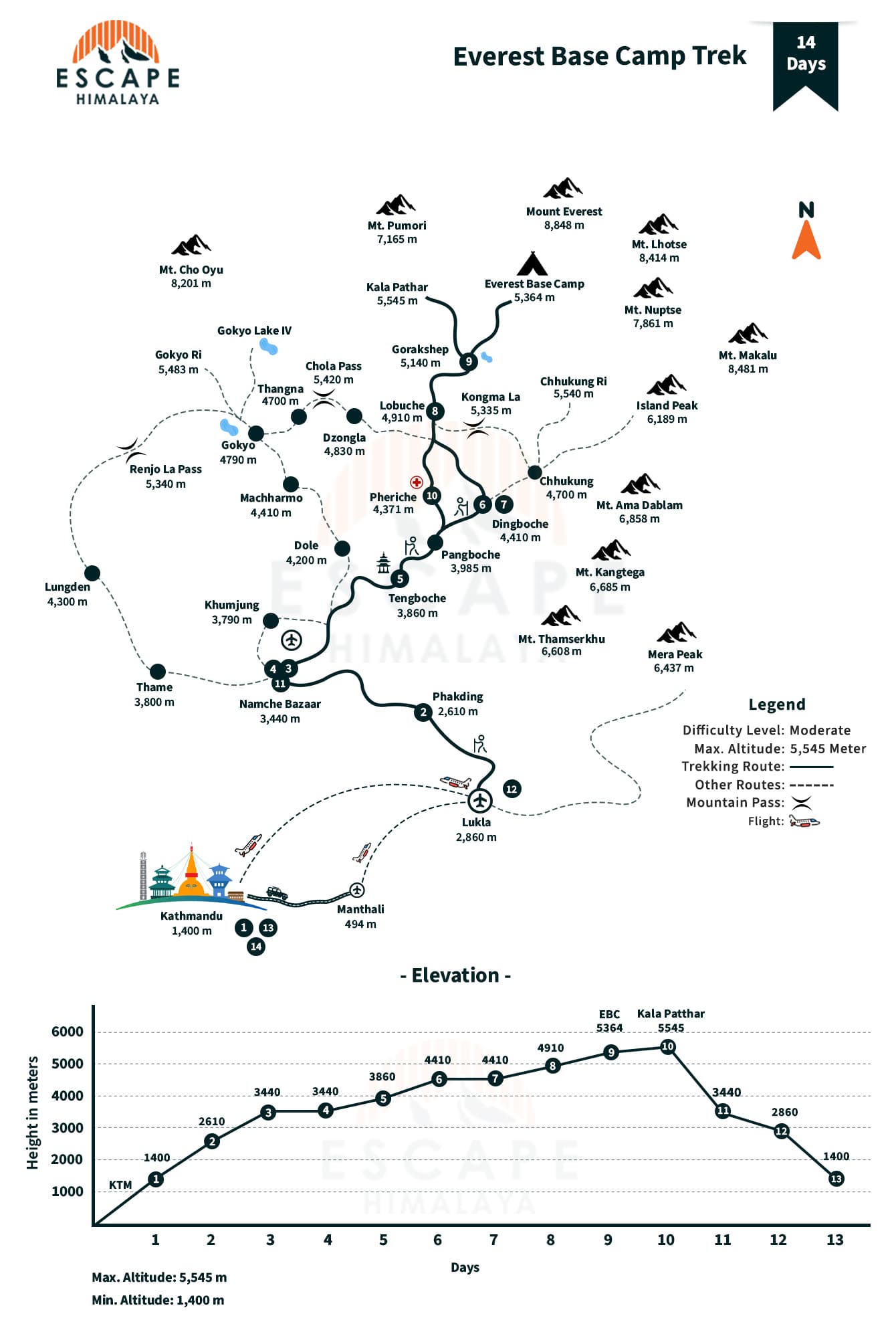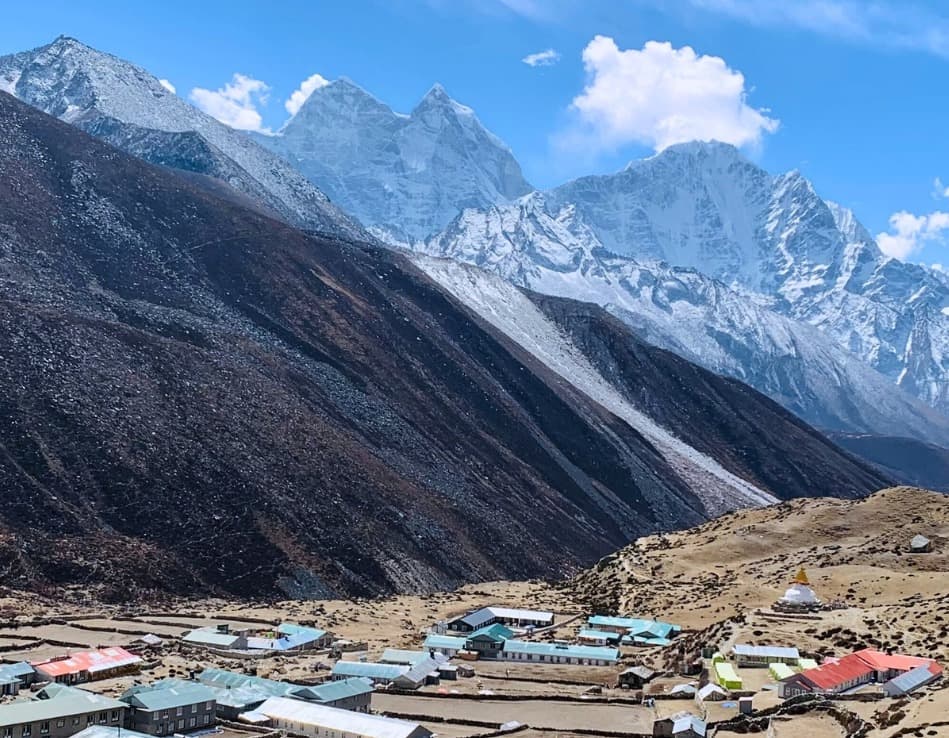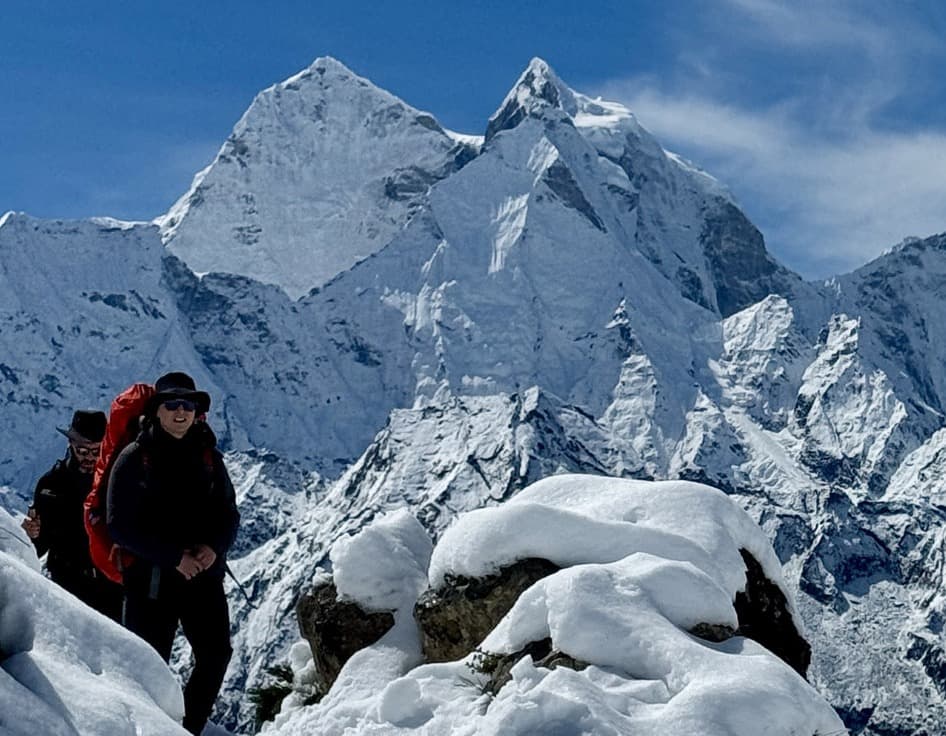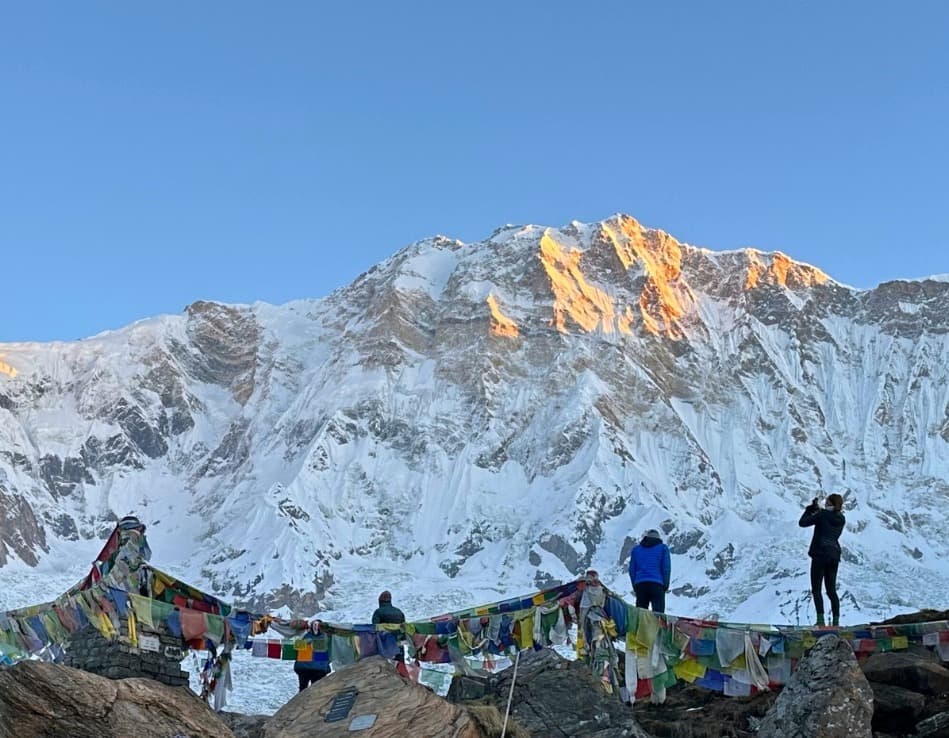Essential Information for Your Everest Base Camp Trek
Arrival and Visa Requirements
Getting to Nepal Upon arrival in Nepal, an Escape Himalaya representative will meet you at Kathmandu's Tribhuvan International Airport. Our team members will be waiting in the arrivals area holding our company sign so you can easily find them. We'll help you with your bags and give you a private ride to your hotel in the Thamel area.
Getting Your Nepal Visa. You can get a visa when you arrive in Nepal at Tribhuvan International Airport or any other entry point. This visa lets you come and go multiple times and stay in Nepal for up to 150 days in one year.
To get your visa, you can fill out the tourist visa form online before you come or use the machines at the airport when you get there. Get your receipt with the barcode, then go to the immigration desk with your passport, arrival card-payment receipts, and the receipt from the online form. Submit your documents to an immigration officer. The visa fee is payable in Nepalese Rupees, US dollars, or other currencies.
You can also apply for your visa in advance at the Nepal Embassy in your country. Through this process, you can reduce the time you spend on immigration during your Everest Base Camp Trek Package.
Difficulty Level of the EBC Trek
The Everest Base Camp trek in Nepal is somewhere between moderate and tough, but most people can do it if they prepare well and get in good shape first. The EBC trek is a long walk to the highest places over 4,500 meters and usually takes 12 to 14 days, with about 6 to 7 hours of walking each day.
The Everest trek takes you through all kinds of different ground, with lots of uphill and downhill parts, plus rocky areas near glaciers. You need to have good stamina and be able to carry a backpack while you walk for hours each day.
On top of the physical stuff, you also need to be mentally tough to deal with the thin air and rough mountain conditions.
The weather in the Everest area changes fast and without warning, which makes this trek more exciting but also harder. The weather can shift quickly and cause flight delays from Lukla, heavy rain, strong winds, or even snow. Bad weather can also cause landslides, avalanches, and flooding in the area.
Even with all these challenges, if you follow a good 14-day plan that includes two rest days in Namche and Dingboche to help your body adjust, you can finish the trek without too much trouble.
Best Season for Everest Base Camp Trekking
The best times for a trek to Everest base camp are spring (March, April, May) and autumn/fall (September, October, November). Most people think these are the perfect months for trekking in Nepal. During these times, you get steady weather, clear mountain views, and great conditions for the EBC trek, but these are also when most tourists come.
- Spring Season (March to May): This is when lots of climbers are getting ready to climb Mt Everest, so you'll see more people on the trails, and the teahouses will be pretty crowded with other trekkers doing the Everest Base Camp trek.
- Fall Season (October to November): This is another really good time for the Everest Base Camp trek. The air is clear, you can see the snowy peaks really well, and there aren't as many people around, so it's just as good as spring for your Everest Base Camp trek.
Trekking in Other Times of Year:
- Monsoon (June to early September): Summer in Nepal means it rains a lot, the trails get slippery, and flights get canceled often, which can mess up your Everest trek.
- Winter (Late December to February): It gets really cold, and many places close down, but winter trekking gives you a quiet, peaceful experience that's better for people who've done lots of trekking before.
Can Beginners Do The Everest Base Camp Trek?
Beginners can definitely finish the Everest Base Camp trek in Nepal if they get ready for it properly and have the right attitude. People who are in decent shape and can walk for five to six hours a day can do this trek without needing any special mountain climbing skills.
At Escape Himalaya, we have successfully organized the Everest Base Camp Trek Package for teenagers and seniors in their late 60s and 70s, proving that age is not a limiting factor. What truly determines success on the Everest Trekking adventure is one's spirit, physical health conditions, and mental determination.
Solo Trekking in the Everest Region
Trekking solo in Nepal's Everest region is officially permitted. But going alone has some real problems like figuring out all the travel details, finding places to stay up in the mountains, dealing with changing weather, and getting all your permits sorted out quickly.
Our team strongly recommends hiring a local guide to ensure your safety and minimize potential issues during your EBC trek. When you go with a guide, you get better help adjusting to the altitude with 2 rest days, quick help if something goes wrong, like needing a helicopter rescue, more flexibility, and a good plan for the Everest Base Camp trek that fits how fit you are.
Escape Himalaya only organizes guided Everest Trek adventures in Nepal, including all routes to Everest Base Camp.
Flights to Lukla Airport
Flights from Kathmandu to Lukla are the primary entrance for trekkers heading to the Everest region, offering a quick yet thrilling way to begin your Everest Base Camp Trek. The flight to Lukla airstrip typically takes around 25 to 30 minutes, covering the 138-kilometer distance between Tribhuvan International Airport in Kathmandu and Tenzing Hillary Airport in Lukla.
Three airlines fly this route: Tara Airlines, Summit Airlines, and Sita Air. These flights usually leave in the morning, starting around 6:00 AM and running until about 10:00 AM. But because the weather in the mountains changes so fast, flights get delayed or canceled a lot, especially in winter and monsoon season.
During peak Everest Trekking seasons (Spring and Autumn), flights to Lukla are often rerouted to Manthali Airport - Ramechhap, because of heavy air traffic at Kathmandu Airport. Trekkers must take a 4 to 5-hours drive from Kathmandu to Manthali airport for an early morning departure. In non-peak seasons, flights usually operate directly from Kathmandu.
- Weight Limit for Lukla Flight: The weight limit for luggage on flights to Lukla is usually 15 kilograms per passenger. The airlines strictly enforce this limit due to the aircraft's small size and limited cargo capacity for your EBC Hike.
- Flight Cancellation Options: The optional helicopter flights from Kathmandu to Lukla to Kathmandu cost USD 400 to 450 per person for a shared ride with 4 to 5 passengers. This gives you a faster and more comfortable way to travel compared to regular airplane flights for your Everest Base Camp trek. You can also get private charter flights for extra money if you want more flexibility with your schedule.
Altitude Sickness Prevention
Altitude sickness, also called Acute Mountain Sickness or AMS, happens when your body can't adjust to having less oxygen at high elevations during your Everest trek in Nepal.
You usually start feeling it above 2,500 meters, and you might get headaches, not feel like eating, have trouble sleeping, things look fuzzy, feel like throwing up, can't catch your breath, your heart beats fast, and you feel worn out.
While these problems are pretty normal, really bad cases can turn into serious lung problems (HAPE) or brain swelling (HACE). The risk of AMS while trekking to Everest Base Camp is significantly lower if prepared well before the trek, hydrating enough, and taking a calm pace during the hike.
To avoid mountain sickness during your EBC Trek, we recommend taking medicine to treat acute mountain sickness a day before climbing to high elevation, particularly at Namche Bazaar, until you reach high altitude areas.
If you get altitude sickness, our guide will check how you're doing with a small device, oximeter that measures your heart rate and oxygen levels, make you rest or go down to lower places, give you water and fluids, give you medicine like Diamox, and if it gets really bad, call our main office to get a helicopter to take you out.
Travel Insurance Requirements
Travel insurance is mandatory for the Everest Base Camp Trek because it saves you from paying a lot of money in emergencies, like if you get sick, hurt, or if your trip gets canceled. The EBC trek takes you to real high altitudes where the weather changes without warning and you're far from hospitals, so getting help can be tough.
Your travel insurance should cover getting sick or injured, accidents, emergency helicopter rescues, if you accidentally hurt someone or break their stuff, if your bags or gear get lost or stolen, if your trip gets canceled or flights get delayed, and someone you can call for help anytime, day or night.
Make sure your policy works for trekking up to at least 5,500 meters. Double-check that it covers those local flights too, because the flights from Lukla get canceled all the time due to bad weather on your Everest Base Camp trek.
Required Permits for EBC Trek 2025
To complete your Everest Base Camp Trek in 2025, you need the following permits:
- Sagarmatha National Park Entry Permit: A national park permit that costs $30 for foreign nationals. You can get this permit at the Sagarmatha National Park entry checkpoint at Monjo during your Everest Trek.
- Khumbu Pasang Lhamu Rural Municipality Entrance Permit: A local permit costs $20. You can get this trekking permit in Lukla or Monjo. This permit is not available in Kathmandu.
The TIMS (Trekkers Information Management System) card is no longer required for Trek to Everest Base. After you complete your booking with Escape Himalaya, we will arrange all necessary trekking permits for your EBC Trek.
Accommodation During the Trek
Hotel Stay in Kathmandu During your stay in Kathmandu (2 nights), you will be accommodated in a 3-star category hotel in the Thamel area, where all essential amenities like hot showers, Wi Fi, and electricity are available. Likewise, they provide a safe store, where you can leave extra items not required for the Everest Trekking and retrieve them after you return.
Mountain Accommodation Trekkers can find teahouses, guesthouses, lodges, and hotels as accommodation options along the Everest Base Camp Trek. In lower elevations, private rooms are readily available in most teahouses. We provide twin sharing rooms in the best available lodges, with attached bathrooms and hot showers at Lukla, Phakding, and Namche Bazaar for added comfort.
Local Sherpa people often run mountain lodges in the Everest region. The rooms usually have two single beds, simple furniture, and basic blankets so you can get some good sleep. Everyone eats together in the main dining room where trekkers hang out, share meals around a warm stove, and talk about Sherpa culture and their day on the trail.
You can get electricity and internet for extra money, and it's usually available near the dining area. The dining room stays warm with a wood burning stove, which feels really good when you come in cold from the high mountains.
Food and Meals on the Trek
Traveling with Escape Himalaya, you'll experience a wide range of delicious meals available along the EBC Hike route. The Everest Base Camp Trek Package price includes three daily meals (breakfast, lunch, dinner) with tea or coffee, with dining options available from teahouse menus.
Breakfast Options: Tibetan bread, chapati, toast, French toast served with butter, jam, and vegetable curry. Other options include pancakes, porridge, and eggs in different styles.
Lunch and Dinner: Popular meals include Dal Bhat, a combination of steamed rice, lentils, vegetables, spinach, pickles, and gundruk, often served with unlimited refills during your Everest Trek. Momos, either steamed or fried dumplings, are a favorite among trekkers. Other common meals include garlic soup, pizza, Thukpa, and meat dishes.
Vegan, vegetarian, and gluten-free meals are available. We recommend informing us in advance if you have dietary restrictions for your Everest Base Camp Trekking journey.
Drinking Water on the Trek
Drinking water is accessible along the EBC Trek route. Staying hydrated during the trek is vital for maintaining your body's hydration level and avoiding mountain sickness at high altitudes. At least three to four liters of water should be enough for daily trekking.
Boiled water is the safest and most convenient option. Most guesthouses will serve it at some cost during your Everest Trek in Nepal. Cold, untreated tap water is free but not recommended.
Internet and Communication
Internet and Wi Fi are available at various points along the Everest Base Camp Trek, but signal is never 100% guaranteed. Most lodges and teahouses provide Wi Fi, though connection quality varies. As you reach higher during your EBC Hike, the cost increases. Wi Fi is unavailable at Everest Base Camp since there are no teahouses.
Mobile Network Coverage Mobile network coverage on the Everest Trekking varies depending on elevation, weather conditions, and location. In lower altitudes like Kathmandu, Lukla, Namche Bazaar, Tengboche Monastery, and Dingboche, network coverage is generally strong. Signal weakens, and in remote areas like Gorak Shep and Everest Base Camp, connectivity becomes unreliable.
Two major mobile network providers operate in Nepal: Nepal Telecom (NTC) and Ncell. NTC is recommended for the Everest region as it provides better coverage at high altitudes. SIM cards for both providers are available at Kathmandu Airport.
Electricity and Charging
Electricity is available during Everest Base Camp Trekking, but it can be limited. The lower section of the trek runs on hydropower electricity, while upper section remote lodges depend on solar energy or generators that run only for few hours in the evening.
Charging stations for devices are near reception areas or dining halls. Teahouse owners charge around $3 to $7 per device depending on elevation during your EBC Trek. Carry a power bank with extra batteries and bring a universal travel adapter.
Toilet and Bathroom Facilities
Trekkers can find modern Western style and Asian style squat toilets along the Everest Base Camp Trek. In lower altitudes like Lukla, Phakding, and Namche Bazaar, travelers can find modern flush toilets with hot shower facilities in some teahouses.
As you travel to higher elevations during your Everest Trek, toilet facilities become simpler. In places like Lobuche and Gorak Shep, there are shared squat toilets in guesthouses.
Everest Base Camp has no permanent bathrooms, so trekkers must use portable toilets. For personal hygiene, carry essential toiletries including soap, hand sanitizer, toilet paper, wet wipes, and other necessary items.
Laundry Services
Laundry services are available at additional cost only at lower elevations like Namche Bazaar. Most teahouses along the EBC Hike route offer hand washing facilities, and some offer professional laundry services for a fee during your Everest Base Camp Trekking.
Packing List for Your EBC Trek
We provide all trekkers with sleeping bags, duffel bags, down jackets, and Everest Base Camp Trek itinerary map during the pre trip meeting at hotel in Kathmandu.
· General Items: Duffel bag (provided), day pack 20 to 22 liter, down jacket (provided), sleeping bag (provided), extra batteries, power bank, chargers, travel adapter, bag covers.
· Clothing: Sun hat, sunglasses with UV protection, scarf and headbands, headlamp, t shirts, fleece jackets, thermal tops, hiking pants, waterproof shell, hiking shorts, lightweight and heavyweight gloves, wool socks, waterproof trekking boots, casual shoes, gaiters.
· First Aid and Medications: Sunscreen high SPF, moisturizer, lip balm, cough syrup for Khumbu cough, mosquito repellent cream, and your personal medications for the Everest Base Camp Trek.
· Other Essentials: Passport, extra passport photos, reusable water bottle, toiletry kits, water purifier, large plastic bags, light towel, toilet paper, hand sanitizer, dry fruits and snacks, waterproof bags for documents.
Everest Base Camp Trek Cost Breakdown
The Everest Base Camp Trek Cost ranges from $1500 to $5000 depending on your comfort level, trekking style, duration, and Everest Base Camp Trek Package including permits, government taxes, round trip flights, accommodation, meals, guides and porters, equipment, travel insurance, visa fees, and personal expenses.
Our EBC Trek Pricing:
- 1 Person: US$1520
- 2 to 3 Person: US$1420
- 4 to 7 Person: US$1390
- 8 to 15 Person: US$1280
The EBC Trek package includes airport transfers, 3 star hotel in Kathmandu, domestic flights, meals, permits, an experienced guide, porters, accommodation with hot showers at select locations, Escape Himalaya gear, seasonal fruits, a first aid kit, and government taxes.
For Everest Base Camp Trekking, we recommend carrying an additional $200 to $250 in cash beyond pre-booked costs to cover snacks, hot showers, Wi Fi, electronic charging, souvenirs, and tips for guide and porter.
Money Exchange
You can exchange money in Nepal at banks, Kathmandu airport, money changers in Thamel, and some towns along the EBC Hike. You can exchange money in Lukla and Namche Bazaar along the trek, but rates may not be as favorable as in Kathmandu Valley.
Many lodges and teahouses accept US dollars during your Everest Trek in Nepal, though exchange rates may vary. It's best to exchange enough Nepalese Rupees in Kathmandu before starting your Trek to Everest Base Camp to avoid higher rates.




